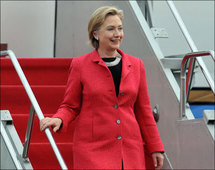
"We understand that we face some immediate obstacles that we hope to resolve in the next couple of weeks", US State Department spokesman Philip Crowley told reporters on the eve of the talks.
Israel plans to end a partial freeze on Jewish settlements on September 26, even though the Palestinians have warned such a move could end the direct talks, which were initiated only 10 days ago in Washington.
US President Barack Obama called last week on Netanyahu to extend the moratorium and Clinton repeated that call on Monday as she flew to Sharm el-Sheikh.
"We have some immediate challenges to overcome that will require both parties to work constructively," Crowley said, without directly mentioning settlements.
The spokesman said the two parties would have to "adopt positions that they have taken publicly on these critical issues.
"That's why the secretary of state is on her way to the Middle East -- to move the parties forward, begin the process of wrestling with the core issues and seeing what progress can be made.
"We're in a critical window the next two to three weeks where we hope that the parties will come prepared to continue to engage constructively, show some creativity in terms of how to navigate through some difficult and challenging and emotional issues", he added.
When Clinton hosted the launch of direct negotiations on September 3 in Washington, both sides agreed to resolve within a year the core issues of Israeli security, borders of a Palestinian state, the fate of Palestinian refugees and the status of Jerusalem.
The Palestinians want a state in the West Bank and Gaza, with east Jerusalem as its capital. Netanyahu has embraced a two-state solution, but has shown no sign on yielding on Jerusalem as the undivided capital of the Jewish state.
-------------------------------------------------------------------------------
Israel plans to end a partial freeze on Jewish settlements on September 26, even though the Palestinians have warned such a move could end the direct talks, which were initiated only 10 days ago in Washington.
US President Barack Obama called last week on Netanyahu to extend the moratorium and Clinton repeated that call on Monday as she flew to Sharm el-Sheikh.
"We have some immediate challenges to overcome that will require both parties to work constructively," Crowley said, without directly mentioning settlements.
The spokesman said the two parties would have to "adopt positions that they have taken publicly on these critical issues.
"That's why the secretary of state is on her way to the Middle East -- to move the parties forward, begin the process of wrestling with the core issues and seeing what progress can be made.
"We're in a critical window the next two to three weeks where we hope that the parties will come prepared to continue to engage constructively, show some creativity in terms of how to navigate through some difficult and challenging and emotional issues", he added.
When Clinton hosted the launch of direct negotiations on September 3 in Washington, both sides agreed to resolve within a year the core issues of Israeli security, borders of a Palestinian state, the fate of Palestinian refugees and the status of Jerusalem.
The Palestinians want a state in the West Bank and Gaza, with east Jerusalem as its capital. Netanyahu has embraced a two-state solution, but has shown no sign on yielding on Jerusalem as the undivided capital of the Jewish state.
-------------------------------------------------------------------------------









 Home
Home Politics
Politics









